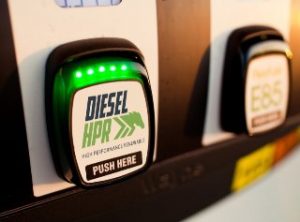 For fleets, transportation companies, and individuals based in Northern California driving diesel-engine vehicles, there’s now a renewable diesel available at fuel stations for about the same price as traditional diesel. California Air Resources Board (CARB) studies show that this renewable diesel can reduce greenhouse gas emissions up to 70% compared to petroleum diesel; and offers significant reduction in nitrogen oxide (NOx) and particulate matter for those concerned about air quality and health issues in regions with high output from commercial trucks.
For fleets, transportation companies, and individuals based in Northern California driving diesel-engine vehicles, there’s now a renewable diesel available at fuel stations for about the same price as traditional diesel. California Air Resources Board (CARB) studies show that this renewable diesel can reduce greenhouse gas emissions up to 70% compared to petroleum diesel; and offers significant reduction in nitrogen oxide (NOx) and particulate matter for those concerned about air quality and health issues in regions with high output from commercial trucks.
Propel Fuels has brought this renewable fuel, called Diesel HPR (High Performance Renewable), to 18 fuel stations in Sacramento, San Jose, East Bay, Redwood City, and Fresno. Diesel HPR was created by Finland-based Neste Oil using that company’s NEXBTL renewable diesel. Diesel HPR is a low-carbon renewable fuel designated as ASTM D-975, the standard for ultra-low sulfur diesel fuel in the US. It’s also recognized as “CARB diesel” by the state agency, and is a certified fuel with the US Environmental Protection Agency. A complete list of Diesel HPR fueling locations is available at dieselhpr.com/locations.
Diesel HPR comes from renewable biomass including recycled fats and oils that can originate from sources such as waste fish oils and vegetable oils. It’s refined from renewable biomass through Neste Oil’s advanced hydrotreating technology that meets the toughest specifications required by automotive and engine manufacturers. Like biodiesel, the fuel offers fleets and consumers the advantage of using a clean fuel in vehicles without paying for vehicle conversions. Diesel HPR can be used by any diesel vehicle. “It’s a clean, clear, odorless fuel that’s highly refined and has low sulfur and carbon,” said Rob Elam, CEO and Co-Founder of Propel Fuels, during a phone interview. “Diesel HPR exceeds conventional diesel in power, performance and value.”
Elam says there’s been tremendous interest in the fuel from owners of diesel-powered cars with Bosch technologies (such as Volkswagen, Audi, and Mercedes-Benz diesel-engine models) that have “No Biodiesel” stickers. Using biodiesel would threaten their warranties. “They’re excited to see Diesel HPR launched,” Elam said.
The fuel’s high-blend rate with reduced greenhouse gas emissions has made it very appealing to corporate and government fleets, he said. “Many fleets are moving towards the state’s Low Carbon Fuel Standard, so low carbon diesel makes sense,” Elam said. Bakeries with a fleet of Sprinters are very interested in the fuel, as are companies in the heavy-duty long-haul trucking business.
While the EPA is still mulling over 2014 production volumes under the Renewable Fuel Standard and its RIN credits, California’s Low Carbon Fuel Standard and cap-and-trade credit market makes the state an appealing place to launch renewable transportation fuels. Clean Energy Fuels would attest to that through its Redeem renewable natural gas; that product is finding interest by fleets wanting to comply with California standards and utilize clean fuels to meet emissions targets.
The Renewable Fuel Standard and RIN debate has been a major concern to the biofuels industry. There has been enough interest in renewable fuels for Neste to bring a large volume of its fuel to California, Elam said. This is the first time renewable diesel is being offered as its own product; it has cost parity with regular diesel in California but its weights and measures are still being worked out by the agencies, he said.
“This renewable diesel joins a growing suite of new, cleaner transportation fuels in California thanks to our Low Carbon Fuel Standard and forward thinking companies like Propel,” said California Air Resources Board Chairman Mary Nichols, in the press release.
Propel Fuels started up in 2004 when it set up the very first public biodiesel station in Seattle. Passage of AB 32 in California motivated the company to bring renewable diesel, ethanol, and biodiesel to fuel stations across California. Oregon has passed a low-carbon fuel standard and the state of Washington is considering one. The company will expand into others states as market demand grows, but as for now, there’s “plenty of growth in California,” Elam said.



